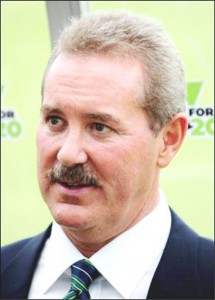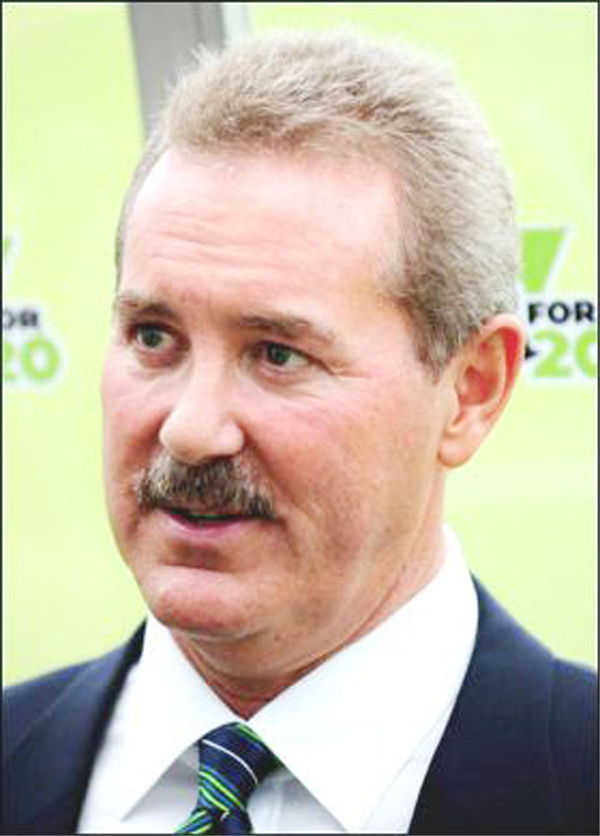MIAMI, (Reuters) – Allen Stanford, the high-flying Texas billionaire with a Caribbean knighthood and a penchant for publicity and cricket, has been brought down to earth with a thud by U.S. fraud charges against him and his companies.
In a self-congratulatory posting on the Stanford Group’s website, its founder and chairman credits his grandfather with giving him “the inspiration to dream” and “an unwavering desire to build a business that is second to none.” He speaks of “a passion for service and the values that hold us together”.

Yesterday, as U.S. marshals swooped down on Stanford’s U.S. headquarters in Houston, federal authorities charged the flamboyant 58-year-old mustachioed financier and three of his companies with a “massive ongoing fraud.”
Accusing him of far less altruistic aspirations than those trumpeted on his website, the U.S. Securities and Exchange Commission alleged Stanford and two fellow executives fraudulently sold $8 billion in high-yield certificates of deposit.
The SEC said they and the bank reported “improbable” high returns and gave “false” assurances to investors.
The SEC’s revelation that Stanford’s business empire — stretching from the Caribbean island of Antigua to Houston, Miami and Caracas — was exposed to losses from the alleged Ponzi scheme run by financier Bernard Madoff completes the picture of a finance king who somehow lost his Midas touch along the way.
Before the SEC civil charges were announced, Stanford dismissed the U.S. federal probe as “routine” and triggered by complaints from disgruntled former employees. He said his company was fully compliant with all U.S. regulations and that he would “fight with every breath to continue to uphold our good name.” Only months ago, Stanford, known as “Sir Allen” in Antigua whose authorities knighted him in 2006, was providing fodder for the British tabloids by flying in by helicopter to bankroll international cricket matches in a blaze of publicity. Now he is out of sight, as his harassed staff in plush company offices from Memphis to Atlanta fend off queries from panicked investors and posses of probing journalists.\
CARIBBEAN POTENTATE
Once described as “haughty, arrogant and obnoxious” by Antiguan Prime Minister Baldwin Spencer, Stanford, America’s 205th richest man according to Forbes magazine, has often walked a fine line between critics and admirers in a business and sporting empire that reaches well beyond Texas to Europe and across the Caribbean.
Spencer said at the weekend he feared the Stanford scandal would hurt the image of the tiny Caribbean state of Antigua and Barbuda, which has undergone scrutiny in the past for alleged money laundering by Ukrainian and Russian Mafia bankers.
But many local islanders expressed support for the country’s biggest investor. “He is the best investor to come into the Caribbean, not only Antigua, but the region,” said islander Julian Exeter. “He puts food in the mouth of everyone in Antigua and money in their pocket,” he said.
Friends say the financier is as genial as he is thick-skinned.
“Allen enjoys life and is the kind of person that doesn’t worry about what other people think,” said David LeBoeuf, a Texan who went to school with Stanford. “Larger than life is one way to describe him, but he’s also an extremely talented, unique and hard-working individual,” he said.
A fifth-generation Texan, Stanford made his first fortune in Houston, snapping up distressed real estate in the early 1980s before inheriting the insurance and real-estate company his grandfather founded in 1932.
Forbes put his personal wealth at $2.2 billion last year and said his list of wealth-management clients includes pro golfer Vijay Singh. He credits his recent success in part to avoiding investments in subprime mortgages that snowballed into a global financial crisis.
Asked by CNBC television in September if it’s fun being a billionaire, he smiled and replied, “Yes, yes, yes. I have to say it is fun being a billionaire. But it’s hard work.”
Back in the United States, he stirred controversy by claiming family ties to Leland Stanford, who founded Stanford University in the 1890s. The university says there is no genealogical connection between the two and sued Stanford Group in October for infringing on its trademark.

